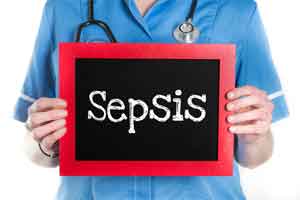- Home
- Editorial
- News
- Practice Guidelines
- Anesthesiology Guidelines
- Cancer Guidelines
- Cardiac Sciences Guidelines
- Critical Care Guidelines
- Dentistry Guidelines
- Dermatology Guidelines
- Diabetes and Endo Guidelines
- Diagnostics Guidelines
- ENT Guidelines
- Featured Practice Guidelines
- Gastroenterology Guidelines
- Geriatrics Guidelines
- Medicine Guidelines
- Nephrology Guidelines
- Neurosciences Guidelines
- Obs and Gynae Guidelines
- Ophthalmology Guidelines
- Orthopaedics Guidelines
- Paediatrics Guidelines
- Psychiatry Guidelines
- Pulmonology Guidelines
- Radiology Guidelines
- Surgery Guidelines
- Urology Guidelines
Sepsis Leading Cause of Hospital Readmission : JAMA

Sepsis hospitalizations account for a higher proportion of unplanned 30-day readmissions than hospitalizations for heart attack, heart failure, COPD, and pneumonia in the United States, according to a study published online by JAMA. The study is being released to coincide with its presentation at the Society of Critical Care Medicine’s 46th Critical Care Congress.
The Centers for Medicare & Medicaid Services (CMS) uses 30-day readmission rates to measure quality of care and guide pay-for-performance. The CMS tracks readmissions following hospitalizations for acute myocardial infarction (AMI; heart attack), heart failure, chronic obstructive pulmonary disease (COPD), and pneumonia because hospitalizations for these conditions are frequent and account for a large proportion of readmissions. The proportion and cost of unplanned readmissions following sepsis hospitalizations are not known.
Sachin Yende, M.D., M.S., of the VA Pittsburgh Healthcare System, and colleagues analyzed data from the 2013 Nationwide Readmissions Database, which aggregates acute care hospitalizations from 21 states and represents inpatient use for 49 percent of the U.S. population. Among 14,325,172 hospitalizations, the researchers identified 1,187,697 index admissions for medical reasons that were associated with an unplanned 30-day readmission. Of those, 12.2 percent had a diagnosis of sepsis; 6.7 percent, heart failure; 5 percent, pneumonia; 4.6 percent, COPD; and 1.3 percent, AMI.
The average length of stay for unplanned readmissions following sepsis hospitalization was longer than readmissions following AMI, heart failure, COPD, and pneumonia. The estimated average cost per readmission was highest for sepsis compared with the other diagnoses.
“Adding sepsis to the Hospital Readmission Reduction Program may lead to development of new interventions to reduce unplanned readmissions and associated costs,” the authors write.

Disclaimer: This site is primarily intended for healthcare professionals. Any content/information on this website does not replace the advice of medical and/or health professionals and should not be construed as medical/diagnostic advice/endorsement or prescription. Use of this site is subject to our terms of use, privacy policy, advertisement policy. © 2020 Minerva Medical Treatment Pvt Ltd